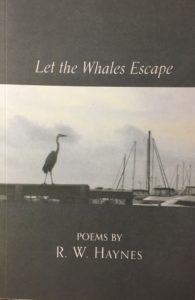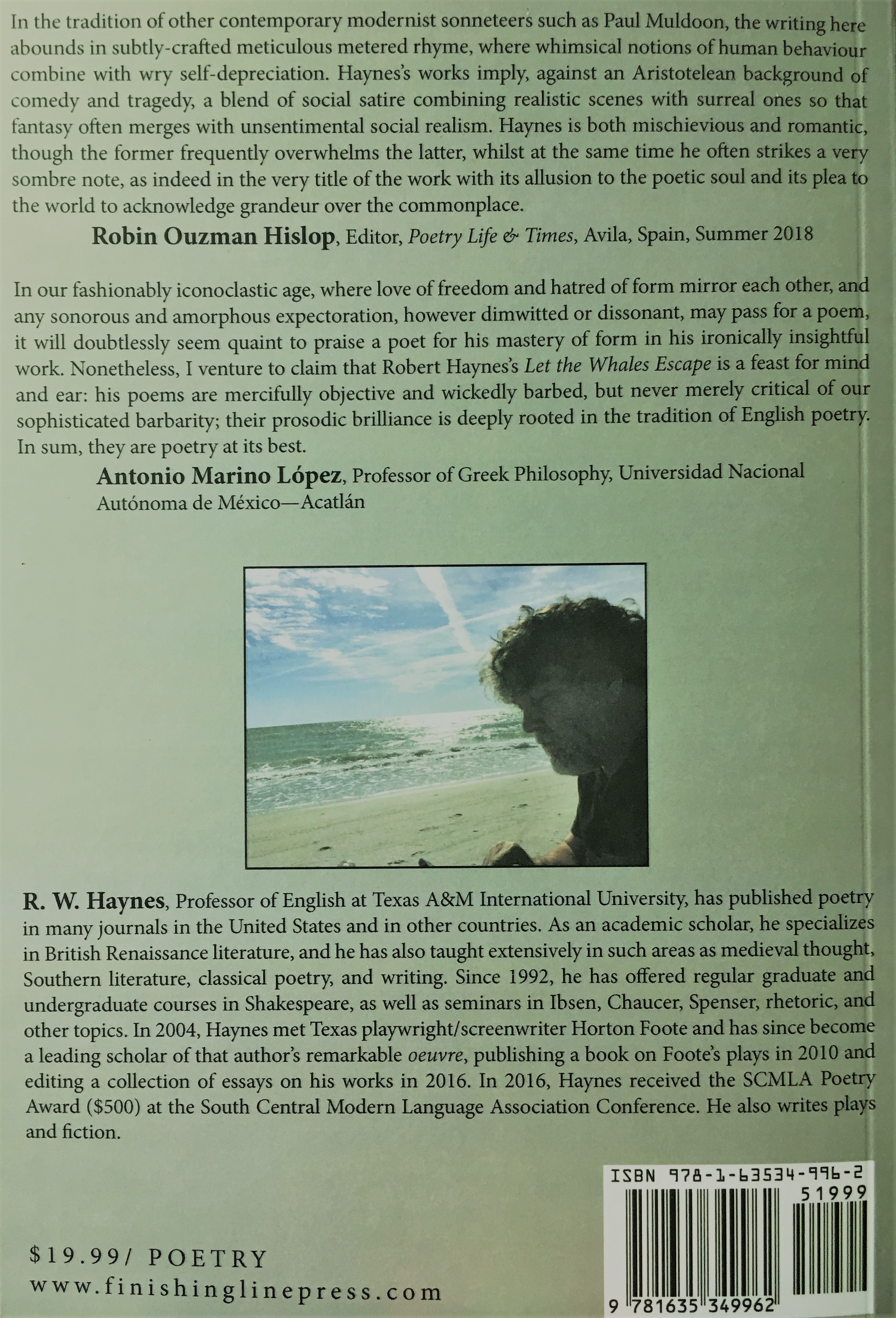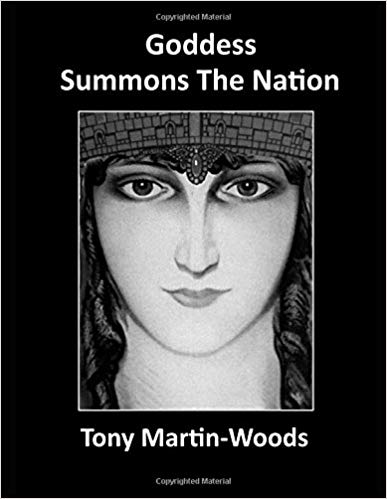


Let the Whales Escape R.W.Haynes
Mona Lisa and the Marlboro Man
Not knowing if wisdom would impulsively fly
Or if it dragged its feet when impulse flared,
She had to make the call and suddenly try
To do what an immortal would have dared,
An Aphrodite, ascending in a flying cart
Drawn by fifty gurgling pigeons at a speed
Which matched the speed of her own matchless heart
And the heartbreaking glory of her need.
Later, back in Laredo, she would say
She didn’t know why she’d taken off that way,
Smiling with satisfaction, recalling when
Her best moments flew by delightfully then.
He didn’t want anyone saying, “Oh.
This is how I feel,” but people do
Say that, and he said it, sometimes, too,
In unguarded moments, and he would show
How he felt, displaying great disdain
As he lit his pipe, blew blue smoke forth
Delivering himself from aesthetic pain
Incurred by foolish ideas from the North,
And, nodding slightly to appreciate
A tolerable turn of phrase which he
Thought suggested some brain activity,
He let his tobacco counter-obfuscate
Suspicious overflows of raw emotion
Which threatened to undermine devotion.
On the Balcony of the Palacio de Cortés
Madness stands at one elbow. At the other
Various figures in masks take their turns,
And all whisper steadily, one after another,
Syllables whose content one never learns.
The maniac is familiar; one keeps a careful eye
On him night and day, and day and night,
But who are the others who are standing by,
And what are these advisements they recite?
I dream the lonely ghost of love is one
Whose only consolation is to speak of sin,
And when that sad companion is done,
I hear Complacency, Madness’s mad twin.
I listen in patience, fighting back the fear
I’ll never hear the voice I hope to hear.
Ibsen on the Nile
Those monuments are monuments merely
Of themselves; this river of nutrition
And death, inundating Egypt, is clearly
A muddy embodiment of time’s volition.
I saw the Sphinx off in the distance. Today
I purchased an ancient mummified hand
To give to my wife, safely far away,
And I suspect that she will understand.
I met DeLesseps recently. He and I
Have much in common, more than he knows;
My work is lonelier, but there exists a tie
Between what we do as humankind grows.
These monuments record the vanity of ages;
Mine put the outraged human soul on stages.
Robin Ouzman Hislop is Editor of Poetry Life and Times ; his publications include
All the Babble of the Souk , Cartoon Molecules and Next Arrivals, collected poems, as well as translation of Guadalupe Grande´s La llave de niebla, as Key of Mist and the recently published Tesserae , a translation of Carmen Crespo´s Teselas.
You may visit Aquillrelle.com/Author Robin Ouzman Hislop about author. See Robin performing his work Performance (University of Leeds)
Poery
Amparo Arróspide Reviews Goddess Summons the Nation Collected Poems by Tony Martin Woods
Goddess Summons the Nation Paperback
Goddess Summons the Nation Kindle Edition

Goddess summons the Nation
a book of poems written with the vocation of songs and minstrelsy, articulated in four chapters with revealing titles, Substructure, Superstructure, Demolition and Flowers. Full of irony, the poetic voice, which is an ethical, indignant voice, wants the written script to transcend in spoken writing (The grapes / don’t die / in the vineyard / with the harvest / in the summer. // They transcend / and translive / victorious / in the wine, // like the poem in the song … ). This book talks to the reader in short, concise verses, with lexicon of the perspective of one who stands on the brink of historical abyss (The West bleeds to death /…). To paraphrase Ezra Pound, this book has style, that is to say, limpidity, as opposed to rethoric; where the poet in dealing with his own time, sees that language does not petrify in his hands; he has prepared for new advances along the lines of true metaphor, that is interpretative metaphor, or image, as diametrically opposed to untrue or ornamental metaphor. These poems daringly address Brexit and Trump, the policy of closing borders and xenophobia, and a nation that appears personified in female allegories – I am the matriot / the highest patriot / I serve my shares / I sooth my country /…, and cyborgs who leave a planet in ruins ( his brain compressed in a zip folder / stored in a private cloud // No memories / just data / …), our own planet from which figs also flee (with millions of figs like me, like you / away from a supernova / of stupid national greed / … ). In one poem, Time to leave Brexit, we can also read the condensed intention of the book: I’ve never been an island, / Nor a chunk of it. / I could never be one / Cause I’m a social being / made of flesh / And emotions. Images of flesh and bone, and emotions that readers will share.
Editor’s Note: see also Artvilla.com Goddess Summons the Nation. By Tony Martin Woods.
Goddess summons the Nation
un poemario escrito con vocación de cancionero y de mester de juglaría, articulado en cuatro capítulos con títulos reveladores, Substructure, Superstructure, Demolition y Flowers. Pleno de ironía, la voz poética, que es una voz ética, indignada, y que pretende que la escritura escrita trascienda en la escritura hablada (The grapes/don´t die/in the vineyard/with the harvest/in the summer.// They transcend/and translive/victorious/in the wine,// like the poem in the song/…). Se interpela al lector en versos breves, concisos, con léxico de nuestro tiempo y una temática actual de quien se sitúa al borde del abismo histórico (The West bleeds to death/…). Parafraseando a Ezra Pound, este es un libro con “style, that is to say, limpidity, as opposed to rethoric”, donde el poeta “in dealing with his own time, sees to it that language does not petrify in his hands; he has prepared for new advances along the lines of true metaphor that is interpretative metaphor, or image, as diametrically opposed to untrue or ornamental metaphor”. Los poemas se atreven con el Brexit, con Trump, con la política de cierre de fronteras y xenofobia, con una nación que aparece personificada en alegorías femeninas – I am the matriot/ the highest patriot/ I serve my shares/ I sooth my country/, y con cíborgs que abandonan un planeta en ruinas (his brain compressed in a zip folder/stored in a private cloud// No memories/just data/…), planeta del que también huyen los higos ( with millions of figs like me, like you/ away from a supernova/of stupid national greed/…). En uno de sus poemas, Time to leave Brexit, también podemos leer la intención condensada del libro: I´ve never been an island,/Nor a chunk of it./ I could never be one/Cause I´m a social being/made of flesh/And emotions… Imágenes de carne y hueso, y emociones que compartirán lectores y lectoras.

Antonio Martínez Arboleda:
Antonio (Tony Martin-Woods) started to write poetry for the public in 2012, at the age of 43, driven by his political indignation. That same year he also set in motion Poesía Indignada, an online publication of political poetry. He runs the poetry evening Transforming with Poetry at Inkwell, in Leeds, and collaborates with 100 Thousands Poets for Change100tpc.org/. Tony is also known in the UK for his work as an academic and educator under his real-life name, Antonio Martínez Arboleda at the University of Leeds. His project of digitisation of poetry, Ártemis, compiles more than 100 high quality videos of Spanish poets and other Open Educational Resources. http://www.artemispoesia.com/ . He is the delegate in the UK of Crátera Revista de Crítica y Poesía Contemporánea , where he also publishes his work as translator from English into Spanish. He published his first volume of poetry in Spanish, Los viajes de Diosa (The Travels of Goddess), in 2015, as a response to the Great Recession, particularly in Spain. His second book, Goddess Summons The Nation, is a critique of the ideas of nation and capitalism, mainly in the British Brexit context. It incorporates voices of culprits, victims and heroes with mordacity and rhythm. It consists of 21 poems, 18 of which are originally written in English. It is available in print and kindle in Amazon and other platforms. Editor’s note: further information bio & academic activities can be found at this link: https://ahc.leeds.ac.uk/languages/staff/91/antonio-martinez-arboleda

Amparo Arrospide (Argentina) is a Spanish poet and translator. She has published seven poetry collections, Mosaicos bajo la hiedra, Alucinación en dos actos algunos poemas, Pañuelos de usar y tirar, Presencia en el Misterio, En el Oido del Viento, Hormigas en Diáspora and Jaccuzzi, as well as poems, short stories and articles on literary and film criticism in anthologies and in both national and foreign magazines. She has received numerous awards. Editor’s Note: see also Poetry, National Literature Prize 2018, Francisca Aguirre, Translated from Spanish by Amparo Arróspide & Robin Ouzman Hislop
Edge. A Poem by Debashish Haar
It’s 2:30 am, pacing on the terrace:
I see me ricochet against the edge
of an open window on the fourth floor.
I feel a strange numbness: a speck of ash
scatters, the end left to fall:
tumble and swing in mid air.
There’s no spark as the stub hits the ground.
I begin each day at 7:00 am
somewhere near the spot
where the stub hit the ground.

Debashish is a machine learning scientist, who has been published in literary magazines several times across the globe, including Poetry Life & Times, where he was interviewed twice. He is currently contending with a severe writer’s block spanning a decade, when he has hardly produced any publishable content. He is also losing emotional connection with his own work gradually, and spends more time to edit/tighten his old poems than creating any new content. Editors Note: Debashish Haar was interviewed twice in the old Poetry Life and Times, once by Sarah Russell then Editor & later by myself as a new Editor before it folded in 2008. The New Poetry Life & Times restarted in 2013 at Artvilla.com site, Admin David Jackson.
Robin Ouzman Hislop is Editor of Poetry Life and Times his publications include All the Babble of the Souk and Cartoon Molecules collected poems and Key of Mist the recently published Tesserae translations from Spanish poets Guadalupe Grande and Carmen Crespo visit Aquillrelle.com/Author Robin Ouzman Hislop about author. See Robin performing his work Performance (University of Leeds) and his latest Collected Poems Volume at Next-Arrivals



